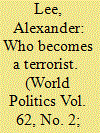|
|
|
Sort Order |
|
|
|
Items / Page
|
|
|
|
|
|
|
| Srl | Item |
| 1 |
ID:
191915


|
|
|
|
|
| Summary/Abstract |
This article describes and explains a previously overlooked empirical pattern in state revenue collection. As late as 1913, central governments in the West collected similar levels of per capita revenue as the rest of the world, despite ruling richer societies and experiencing a long history of fiscal innovation. Western revenue levels permanently diverged only in the following half-century. We identify the twentieth-century great revenue divergence by constructing a new panel data set of central government revenue with broad spatial and temporal coverage. To explain the pattern, we argue that sustainably high levels of revenue extraction require societal demand for an activist state, and a supply of effective bureaucratic institutions. Neither factor in isolation is sufficient. We formalize this insight in a game-theoretic model. The government can choose among low-effort, legibility-intensive, and crony-favoring strategies for raising revenues. Empirically, our theory accounts for low revenue intake in periods of low demand (the nineteenth-century West) or low bureaucratic capacity (twentieth-century former colonies), and for eventual revenue spikes in the West.
|
|
|
|
|
|
|
|
|
|
|
|
|
|
|
|
| 2 |
ID:
167439


|
|
|
|
|
| Summary/Abstract |
Extensive research suggests that European rule negatively affected political and economic development in their colonies. But did outcomes improve after colonial rule ended? Studying post–World War II independence cases, we statistically examine consequences of postwar decolonization—which includes both colonial autonomy and independence—for democracy, internal conflict, government revenue growth, and economic growth using two-way fixed-effects models. We find that democracy levels increased sharply as colonies gained internal autonomy in the period immediately before their independence. However, conflict, revenue growth, and economic growth did not systematically differ before and after independence. Accounting for varieties of colonial institutions or for endogenous independence timing produces similar results. Except for democratic gains, the overall findings—juxtaposed with existing research—suggest that, although European colonial empires created deleterious long-term effects, decolonization exhibited less pronounced political consequences than sometimes thought.
|
|
|
|
|
|
|
|
|
|
|
|
|
|
|
|
| 3 |
ID:
103863


|
|
|
|
|
| Publication |
2011.
|
| Summary/Abstract |
Many studies of the social backgrounds of terrorists have found that they are wealthier and better educated than the population from which they are drawn. However, studies of political behavior have shown that all forms of political involvement are correlated with socioeconomic status. Among those who are politically active, opportunity costs may lead those involved in nonviolent activities to have a average social status than violent individuals with a similar ideological orientation. This article develops a theory of participation in violence that incorporates both opportunity costs and informational barriers to participation and tests it by comparing violent and nonviolent political activists involved in the anticolonial agitation in Bengal (1906-39) using data from their police files. While the Bengali terrorists are better educated and have higher status jobs than the population average, they are less educated and less wealthy than the nonviolent activists. These results suggest that socioeconomic status may play a substantial negative role in terrorist recruitment within elites.
|
|
|
|
|
|
|
|
|
|
|
|
|
|
|
|
|
|
|
|
|